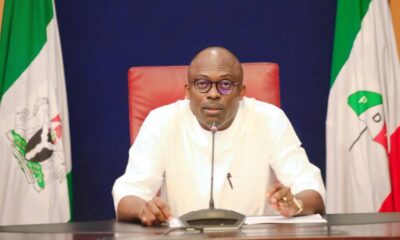Health
‘Health Insurance, Central To FG’s Healthcare Plans’
Vice President Yemi Osinbajo on Monday said the Federal Government has made the National Health Insurance Scheme central to its plans for the healthcare system in the country.
Osinbajo’s spokeman, Laolu Akande, said the Vice President communicated this while receiving a delegation of the Nigerian Medical Association (NMA) at the Presidential Villa, Abuja.
He said an effective National Health Insurance Scheme remained the best option for the development of the health sector and an efficient healthcare delivery in the country.
The vice president said that health insurance would remain very prominent in APC’s next level document.
”We have a good opportunity to do something about the National Health Insurance within the next four years of our tenure.
“It is obvious that government, at both the Federal and State levels cannot adequately provide healthcare services for the almost 200million Nigerian people.”
Citing India as an example, he said that Asian country, with a population of over one billion people had the most privatised healthcare system in the world, with individual states being responsible for providing healthcare services.
Osinbajo emphasised the need for doctors to be remunerated properly regardless of their location, either rural or urban.
“We must find a logical way of addressing this issue.
“We must ensure that the states pick up their own part of the responsibility of providing healthcare at their own level.
“ Through the National Economic Council (NEC), there is the opportunity to talk to State governors and one of the things we do is to look at the human development indices, especially for Primary Health Care.
“There are States that are simply not doing enough and we must ensure that they scale up to the plate. States must be held to account because a lot of the responsibilities are theirs,” he said.
The vice president said that National Health Insurance was key in resolving a lot of the financial problems in the Health Sector
Earlier, the Minister of Health, Prof. Isaac Adewole, spoke about the ministry’s strides in achieving the Universal Health Coverage towards the expansion of the National Health Insurance Scheme.
He thanked the Presidency for the presidential assent to the Appropriation Act, which for the first time, approved the release of the one per cent for Basic Healthcare Provision Fund.
Adewole disclosed that the Ministry of Finance had released the first quarter allocation of N13.7 billion.
Similarly, the minister also said that the Basic Health Care Provision Fund would help in fast tracking the development of the National Health Insurance Scheme.
In his remarks, the President of the Nigerian Medical Association, Dr. Francis Faduyile, congratulated President Muhammadu Buhari and Prof. Yemi Osinbajo on their victory at the just concluded 2019 Presidential elections.
He also acknowledged the administration’s efforts in the health sector, which, he said, included the signing of the Residency Training Act, the release of the Basic Healthcare Provision Fund, as well as the recently improved Cancer Centre in Lagos University Teaching Hospital.(NAN)
Health
‘How Micro RNA Research Won Nobel Prize’
Two United States scientists who unraveled the human micro RNA have won the Nobel Prize in Physiology or Medicine 2024.
Victor Ambros and Gary Ruvkun won the coveted prize for their work on microRNA as their discoveries help explain how complex life emerged on earth and how the human body is made up of a wide variety of different tissues.
MicroRNAs influence how genes – the instructions for life – are controlled inside organisms, including humans.
Every cell in the human body contains the same raw genetic information, locked in our DNA.
However, despite starting with the identical genetic information, the cells of the human body are wildly different in form and function.
The electrical impulses of nerve cells are distinct from the rhythmic beating of heart cells. The metabolic powerhouse that is a liver cell is distinct to a kidney cell, which filters urea out of the blood.
The light-sensing abilities of cells in the retina are different in skillset to white blood cells that produce antibodies to fight infection.
So much variety can arise from the same starting material because of gene expression.
The US scientists were the first to discover microRNAs and how they exerted control on how genes are expressed differently in different tissues.
The medicine and physiology prize winners are selected by the Nobel Assembly of Sweden’s Karolinska Institute.
They said: “Their groundbreaking discovery revealed a completely new principle of gene regulation that turned out to be essential for multicellular organisms, including humans.
“It is now known that the human genome codes for over 1,000 microRNAs.”
Health
WHO Begins Regulation On Antibiotic Waste
The World Health Organisation (WHO) has begun acting to curb effects of antibiotic pollution.
The new guidance on wastewater and solid waste management for antibiotic manufacturing sheds light on this important but neglected challenge ahead of the United Nations General Assembly (UNGA) High-Level Meeting on antimicrobial resistance (AMR) taking place on 26 September 2024.
The emergence and spread of AMR caused by antibiotic pollution could undermine the effectiveness of antibiotics globally, including the medicines produced at the manufacturing sites responsible for the pollution.
Despite high antibiotic pollution levels being widely documented, the issue is largely unregulated and quality assurance criteria typically do not address environmental emissions. In addition, once distributed, there is a lack of information provided to consumers on how to dispose of antibiotics when they are not used, for example, when they expire or when a course is finished but there is still antibiotic left over.
“Pharmaceutical waste from antibiotic manufacturing can facilitate the emergence of new drug-resistant bacteria, which can spread globally and threaten our health. Controlling pollution from antibiotic production contributes to keeping these life-saving medicines effective for everyone,” said Dr Yukiko Nakatani, WHO Assistant Director-General for AMR ad interim.
Globally, there is a lack of accessible information on the environmental damage caused by manufacturing of medicines.
“The guidance provides an independent and impartial scientific basis for regulators, procurers, inspectors, and industry themselves to include robust antibiotic pollution control in their standards,” said Dr Maria Neira, Director, Department of Environment, Climate Change and Health, WHO. “Critically, the strong focus on transparency will equip buyers, investors and the general public to make decisions that account for manufacturers’ efforts to control antibiotic pollution.”
Health
Kebbi Harmonises Doctors’ Salaries To Curb Brain Drain
In a concerted effort to curb brain drain, the Kebbi State Government has harmonised medical doctors’ salaries to be at par with their colleagues in the federal government’s tertiary health facilities.
Kebbi State Commissioner for Health, Musa Inusa-Isma’il, disclosed this at the handing over of ambulances to the state-owned health facilities at the Ministry of Health in Birnin Kebbi yesterday.
Inusa Isma’il, according to a statement by Ahmed Idris, the Chief Press Secretary to the governor, said the essence of the harmonisation was to retain the existing medical doctors and attract more to the services of the state.
According to him, the doctors across the state had already started enjoying the new salaries from August 2024.
He said the release of the vehicles was in fulfilment of Governor Nasir Idris’ promise to uplift health care services in the state.
“His Excellency said I should inform you, the beneficiaries of this gesture, that the vehicle should be strictly used for the intended purpose. It should not be used for anything else.
“If there is no referral case, each of the vehicles must be parked at the hospital by 6 pm. The governor said you should warn your drivers against reckless driving as well as violating the instructions.
“We should also do everything possible to reciprocate the gesture by working according to the terms and conditions attached,” he advised.
The benefiting health facilities included Sir Yahaya Memorial Hospital, Birnin Kebbi; State Teaching Hospital, Kalgo; General Hospital, Argungu; General Hospital, Yauri; General Hospital, Zuru; and General Hospital, Bunza.
In his speech, the permanent secretary of the ministry, Dr Shehu Koko, recalled that the ambulances were handed over to the ministry last Friday by the governor for the onward handover to the benefiting hospitals.
He observed that the ambulances would go a long way in improving the referral system in the state, adding that delays in reaching the secondary and tertiary facilities would be eliminated.
The permanent secretary attributed the high rate of maternal mortality in the country to delays in getting to the health facilities for proper medical care.
“We believe with the provision of these ambulances, part of the gaps we have in our referral system will be addressed, whereby patients who require secondary healthcare could be easily transported to secondary and tertiary health centres, where they can get such help,” he said.
In a goodwill message, Commissioner for Information and Culture Alhaji Yakubu Ahmed expressed gratitude to the governor for the support he has given to the ministry to excel.
While advising the beneficiaries to use the vehicles judiciously, the commissioner advised that services and maintenance of the vehicles must be prompt to derive the maximum benefits from the vehicles.
The commissioner also highlighted some achievements recorded by the government in the last year, including beautification of the state capital, completion of a multimillion-naira ultramodern state secretariat, road construction, construction and renovation of classrooms and upgrading of some health facilities, among others.
-

 News3 days ago
News3 days agoFubara Reassures Rivers People Of Completion Of PH Ring Road Project
-

 Rivers3 days ago
Rivers3 days agoWorld Food Day: Farmers Urge Collaboration For Improved Productivity
-

 Nation3 days ago
Nation3 days agoMOSIEND Hails Benibo Anabraba Appointment As Rivers SSG
-

 Rivers3 days ago
Rivers3 days agoIAUE Governing Council Chair Assures On Mandate Delivery
-

 Featured3 days ago
Featured3 days agoFubara Tasks New SSG On Honour, Service, Protection Of Rivers Interest
-
Opinion3 days ago
Dangers Of Unchecked Growth, Ambition
-

 Editorial3 days ago
Editorial3 days agoMaking Rivers’ Seaports Work
-

 News3 days ago
News3 days agoRSG Cancels ?134BN Secretariat Contract, Orders Refund Of ?20BN Mobilisation … Revalidates Four Projects

